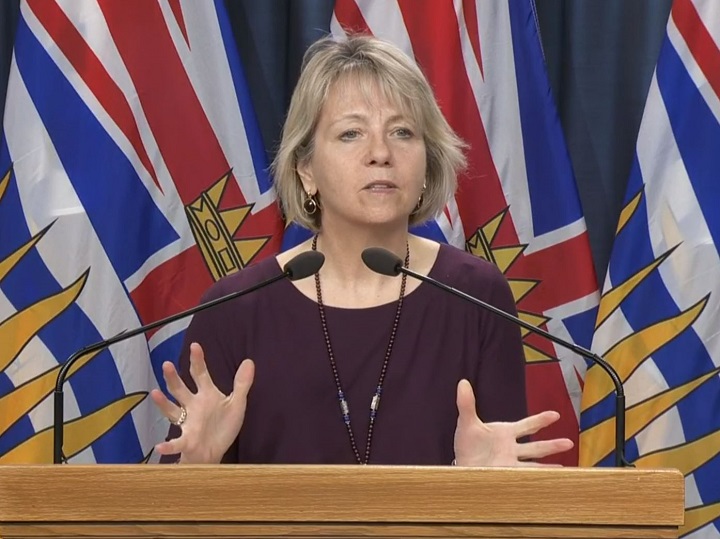B.C.’s top doctor has released an op-ed piece, defending the province’s practice of not publicly releasing where each confirmed COVID-19 patient is living.

Provincial health officer Dr. Bonnie Henry says the transmission of the novel coronavirus has “no boundary.”
“It would be irresponsible to mention only a few communities and give people outside those areas a false sense that they are not susceptible or at lower risk,” Henry writes in the op-ed, sent out by the provincial government via email.
“Every health region in British Columbia has people with COVID-19. Every community and hometown — no matter how large or small — is at risk.”
Countless members of the public have asked where the patients are living, especially those in smaller, more rural communities, saying they need to protect themselves.
Henry has also been asked why she won’t give out the locations, when regional health authorities have done just that, even released the names of schools, where outbreaks of the measles occur.
In news conferences, she’s replied that measles and COVID-19 are different in that measles can linger in the air, while COVID-19 does not.
The province is also mindful that someone with a communicable diseases can be stigmatized, if associated with infection.

“We want people who have symptoms to contact us and to feel safe contacting us, knowing their personal information will be protected. This is important to everyone. It allows public-health teams to do the work they need to do to keep all of us safe,” writes Henry, who has also worked during the SARS, Ebola and H1N1 influenza outbreaks.
“So, while I understand the desire to know and understand what the COVID-19 situation is in your community, I need to emphasize that knowing where the positive cases are does not protect you, your family or your community. The actions you take will do that.”

The government does notify the public in a specific community if health officials are not entirely sure if someone may have contracted a virus. These notifications are sent out by the local health authorities.
“Public-health protocols also dictate that when the potential for transmission is unknown, we must immediately alert the public,” Henry says.
“From the very beginning of the COVID-19 outbreak in B.C., we have been doing exactly that — alerting people to the risks within communities through regular briefings and connecting with individuals who are close contacts. When we cannot close the circle, we open the circle.”
- Wegovy now in Canada: Who should (and shouldn’t) use the weight-loss drug
- N.B. woman must move to Toronto for life-saving lung transplant. She can’t afford to go
- Amid bird flu spread, Canada boosts surveillance and testing at border
- Abortion is set to be a key U.S. election issue. Which side has momentum?





Comments